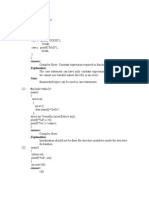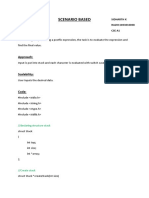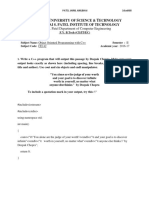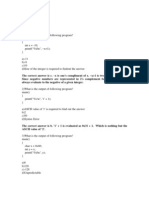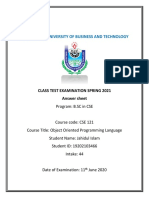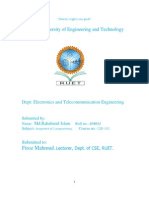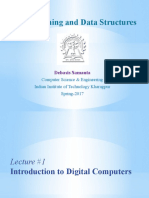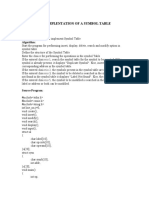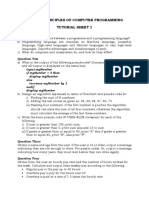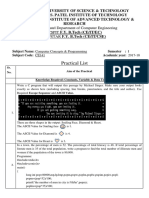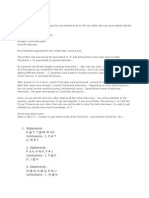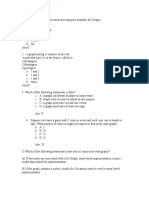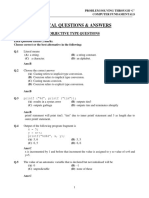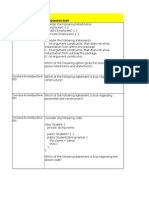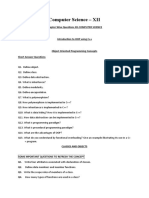C - Aptitude
Questions
1) #include<stdio.h>
main()
char c=125;
c+=10;
printf("%d\n",c);
2) #include<stdio.h>
main()
int c=10;
printf("%d %d %d %d\n",c++,++c,c++,++c);
3) #include<stdio.h>
main()
int n=0xfffd;
printf("%x\n",n & 1);
4) #include<stdio.h>
main()
{
unsigned char temp=0xff;
printf("\n%d\n",temp >> 5);
printf("\n\r %d\n",temp >> 5);
printf("\n%d\n",temp);
5) Which is predominant; precendece or associativity?
6) Write a Program to swap two variables without using a temporary
variable.
7) #include<stdio.h>
main()
unsigned int i=13;
int count=0;
for(;i;i>>=1)
if(i & 1)
count++;
printf("%d\n",count);
8) #include<stdio.h>
main()
int a=2;
if(a==2)
a=~a+2<<1;
printf("%d\n",a);
9) #include<stdio.h>
main()
int i=258;
char c1=i;
char c2=i>>8;
printf("c1=%d c2=%d c1+c2=%d\n",c1,c2,c1+c2);
10) #include<stdio.h>
main()
int a=-12,b=-12,c=-12,d=-12;
a=a>>1;
b=b>>2;
c=c>>3;
d=d>>4;
printf("%d %d %d %d\n",a,b,c,d);
}
11) #include<stdio.h>
main()
float a=0.55,b=0.80;
if((a && b)>0.80)
printf("if\n");
else
printf("else\n");
12) #include<stdio.h>
int y=10;
main()
int x=10;
printf("%d %d %d\n",x=30,x>10,x=10);
printf("%d %d %d\n",y=30,y>10,y=10);
13) #include<stdio.h>
main()
int i=-3,j=2,k=0,m;
m=++i || ++j && ++k;
printf("%d %d %d %d\n",i,j,k,m);
a) -2 2 0 1
b) -2 3 1 0
c) -2 2 1 1
d) none of these
14) #include<stdio.h>
main()
int i=3;
int j;
j=sizeof(++i + ++i + ++i);
printf("i=%d j=%d\n",i,j);
15) #include<stdio.h>
main()
int a,b,c,d;
a=3;
b=5;
c=a,b;
d=(a,b);
printf("%d %d\n",c,d);
16) #include<stdio.h>
main()
{
int a=0,b;
b=(a=0)?2:3;
17) #include<stdio.h>
main()
int a=5,b=6;
int max;
a>b?max=a:max=b;
printf("max=%d\n",max);
18) #include<stdio.h>
main()
int i=4;
switch(i)
default: ;
case 3:
i+=5;
if(i==8)
i++;
if(i==9)
break;
i*=2;
i-=4;
break;
case 8:
i+=5;
break;
printf("i=%d\n",i);
19) #include<stdio.h>
main()
int q,i,j,count;
i=j=0;
q=2;
count=6;
switch(3)
case 0:while(--count>0)
case 1:++j;
case 2:++i;
case 3: ;
case 4: ;
case 5: ;
}
printf("%d ",i);
printf("%d \n",j);
20) #include<stdio.h>
#define MAX 100
#define MIN 100
main()
int x=200;
if(x>MAX)
x=1;
else if(x<MIN)
x=0;x=50;
a) 200
b) 1
c) 0
d) 50
21) #include<stdio.h>
main()
int i;
for(i=4;i<10;i=i+2)
{
i=i-2;
printf("%d ",i);
22) For the below code how many times loop will be rotate
for(i=0;i==10;i+=2)
printf("HI...\n");
a) 10
b) 2
c) 5
d) none of these
23) #include<stdio.h>
main()
unsigned int i=5,c;
for(c=0;i;c++)
i&=i-1;
printf("%d\n",c);
a) finds out if i is even or odd
b) finds out the number of bits set in i
c) finds out the number of bits non set in i
d) none of these
24) #include<stdio.h>
main()
int i,j,c1=0,c2=0;
for(i=0;i<10;i++,c1++)
for(j=0;j<20;j++,c1++);
for(i=0;i<20;i++,c2++)
for(j=0;j<10;j++,c2++);
printf("c1=%d c2=%d\n",c1,c2);
if(c1==c2)
printf("c1==c2\n");
else if(c1>c2)
printf("c1>c2\n");
else if(c1<c2)
printf("c1<c2\n");
else
printf("not \n");
25) #include<stdio.h>
main()
int i=20,j,k=0;
for(j=1;j<i;j=a+4*(i/j))
k+=j<10?4:3;
printf("%d\n",k);
a) 4
b) 0
c) 1
d) 2
26) #include<stdio.h>
main()
int a[5]={2,3};
printf("%d %d %d\n",a[2],a[3],a[4]);
a) garbage
b) 2 3 3
c) 3 2 2
d) 0 0 0
27) What is the difference between array and pointer.
28) #include<stdio.h>
main()
char *a,*b;
a=b=NULL;
a++;
b++;
b++;
// printf("%d\n",a+b);
printf("%d\n",a-b);
29) #include<stdio.h>
main()
int arr[]={12,13,14,15,16};
printf("%d ,%d ,%d\n",sizeof(arr),sizeof(*arr),sizeof(arr[0]));
30) #include<stdio.h>
main()
double a[2][3];
printf("%d ",sizeof(a));
printf("%d ",sizeof(a[1]));
printf("%d \n",sizeof(a[1][1]));
31) main()
{
int val = 5;
printf(“%d\n”,++val++);
int *p=&val;
printf(“%d\n”,++*p++);
}
32) #include<stdio.h>
main()
{
char *ptr="Hello World";
*ptr='h';
printf("%s",*ptr);
33) #include<stdio.h>
main()
char *str="This";
char *ptr="Program";
str=ptr;
printf("%s %s\n",str,ptr);
34) Difference between const char *p, char const *p, char *const p.
a) there is no difference at all
b) first two same, they declare a pointer to a const character the
third one declares a
const pointer to a (variable) character
c) the first one declares a pointer to a const character,the last
two are same they declare
a const pointer to a(variable) character
d) none of these.
35) #include<stdio.h>
int square (volatile int *ptr)
{
return *ptr * *ptr;
}
void f(char *k)
k++;
k[2]='m';
main()
char s[]="hello";
f(s);
printf("%c\n",*(s+2));
36) #include<stdio.h>
main()
char s[]="man";
int i;
for(i=0;s[i];i++)
printf("\n%c %c %c %c",s[i],*(s+i),*(i+s),i[s]);
printf("\n");
37) What is array of pointer & pointer to an array and what is the
difference.
38) #include<stdio.h>
main()
int i,a[]={2,4,6,8,10};
change(a,5);
for(i=0;i<=4;i++)
printf("%d ",a[i]);
void change(int *b,int n)
int i;
for(i=0;i<n;i++)
*(b+1)=*(b+i)+5;
39) #include<stdio.h>
void t1(char *q)
if(*q!='r')
putchar(*q);
//t1(q++);//segmentation fault
t1(++q);
main()
char *p;
p="abcder";
t1(p);
40) #include<stdio.h>
void f1(int *,int);
void f2(int *,int);
void (*p[2])(int *,int);
main()
int a;
int b;
p[0]=f1;
p[1]=f2;
a=3;
b=5;
p[0](&a,b);
printf("%d\t %d\t",a,b);
p[1](&a,b);
printf("%d\t %d\t",a,b);
void f1(int *p,int q)
int temp;
temp=*p;
*p=q;
q=temp;
void f2(int *p,int q)
int temp;
temp=*p;
*p=q;
q=temp;
41) #include<stdio.h>
main()
int arr[2][2][2]={10,2,3,4,5,6,7,8};
int *p,*q;
p=&arr[1][1][1];
q=(int*)arr;
printf("%d,%d\n",*p,*q);
42) test is run from command line as ./test Friday Tuesday Sunday
#include<stdio.h>
main(int argc,char *argv[])
printf("%c\n",**++argv);
a) t
b) F
c) test
d) Friday
43) #include<stdio.h>
main(int argc,char **argv)
if(argc==1)
printf("error\n");
printf("%c ",*(argv[1]+1));
printf("%c ",(*(argv+1))[2]);
printf("%c \n",argv[1][2]); }
44) What does the following mean
int (*ptr)[10];
a) invalid declaration
b) ptr is a pointer to an array of 10 integers
c) ptr is an array of 10 pointers to integers
d) none
45) #include<stdio.h>
main()
int a[][3]={1,2,3,4,5,6};
int (*ptr)[3]=a;
printf("%d %d ",(*ptr)[1],(*ptr)[2]);
++ptr;
printf("%d %d \n",(*ptr)[1],(*ptr)[2]);
46) #include<stdio.h>
main()
char *ptr;
ptr=(char *)strtok("jan:feb:mar",":");
printf("%s\n",ptr);
do
ptr=strtok('\0',":");
if(ptr)
printf("%5s\n",ptr);
}while(ptr);
47) #include<stdio.h>
int fun_def(int a,int b)
return a%b;
main()
int a,b;
int (*fn_ptr)(int,int);
a=4;
b=3;
fn_ptr=fun_def;
printf("the output is :%d\n",fn_ptr(a,b));
48) #include<stdio.h>
void foo(int b[][3])
++b;
b[1][1]=9;
main()
int a[3][3]={{1,2,3},{4,5,6},{7,8,9}};
foo(a);
printf("%d\n",a[2][1]);
49) Which is correct declaration when f is function returning pointer to
an array of pointer
to function returning character?
a) char (*(*f())[])();
b) char *(*f())[];
c) char (*f()[]());
d) char [*(*f())];
50) what would be the output of following program assuming that the array
begin at
location 1002 ?
#include<stdio.h>
main()
int a[2][3][4]= {
{ 1,2,3,4,
5,6,7,8,
9,1,1,2
},
2,4,1,7,
6,7,8,9,
0,0,0,0
};
printf("%u %u %u %d\n",a,*a,**a,***a);
}
a) 1002 1002 1002 1002
b) 1002 1002 1002 1
c) 1002 1002 0 1
d) none
51) Memory of 20 bytes is allocated to a string declared as char *s.what
is the value of strlen(s) after copying a string
"Entrance" into that
a) 20
b) 8
c) 9
d) 21
52) #include<stdio.h>
void foo(int a,int b,...)
int j;
int *ptr=&b;
j=0;
while(j<a)
printf("%d ",*ptr);
++j;
++ptr;
}
main()
foo(1,5);
foo(2,5,6);
53) #include<stdio.h>
void f(char *);
main()
f("123");
void f(char a[])
if(a[1]=='\0')
return;
f(a+1);
f(a+1);
printf("%c ",a[1]);
printf("\n");
54) #include<stdio.h>
static unsigned char h[5]={1,2,3,4,5};
main()
struct ad{
unsigned short a;
unsigned short b;
};
struct ad *it;
it=(struct ad *)h;
printf("%d ",it->a);
printf("%d \n",it->b);
55) #include<stdio.h>
int main()
static int var=7;
int data;
if(--var)
data = main()+var;
printf("%d ",data);
56) #include<stdio.h>
int foo(int x,int n)
int val;
val=1;
if(n>0)
if(n%2==1)
val=val*x;
val=val*foo(x*x,n/2);
main()
int r;
r=foo(2,4);
printf("%d\n",r);
57) What is memory leak? What functions you call to check memory
availability?
How can you avoid memory leaks?
58) if p1 address is 1002 then what will be the addresses for p2 and p3
pointers.
#include<stdio.h>
#include<stdlib.h>
main()
int *p1,*p2,*p3;
p1=malloc(10);
printf("p1----> %u\n",(unsigned int)p1);
free(p1);
p2=malloc(5);
printf("p2----> %u\n",(unsigned int)p2);
free(p2);
p3=malloc(5);
printf("p3----> %u\n",(unsigned int)p3);
free(p3);
59) #include<stdio.h>
#include<string.h>
void allocate(char *s)
s=malloc(10);
strcpy(s,"hello");
60) #include<stdio.h>
#include<malloc.h>
main()
int *p = (int *)malloc(10);
printf(“p = %u\n”,(unsigned int)p);
int *q = (int *)malloc(10);
printf(“q = %u\n”,(unsigned int)q);
free(p);
int *r = (int *)malloc(10);
printf(“r = %u\n”,(unsigned int)r);
}
61)What is void pointer?Why can't we perform arithemetic on a void *
pointer?
62) Does an array always get converted to a pointer? What is the
difference between arr and &arr? How does one declare a pointer to an
entire array?
63) main()
printf("%d %d\n",sizeof("string"),strlen("string"));
64) #include<stdio.h>
main()
int x=20;
int x=40;
printf("%d ",x);
printf("%d \n",x);
65) #include<stdio.h>
void func()
int x=0;
static int y=0;
x++;
y++;
printf("%d------%d\n",x,y);
66) main()
func();
func();
67) #include<stdio.h>
char i;
void try1()
static char *ptr="abcde";
i=*ptr;
printf("%c ",i);
try2(++ptr);
void try2(char *t)
static char *pt;
pt=t+strlen(t)-1;
if(i!=*pt--)
if(t!=pt)
try1();
main()
{
try1();
68) what do you mean following code.
static int func(const char c)
_____________________________;
a) return value of func is a static integer
b) scope of func is limited to the file
c) static cannot be used in the above context
d) none of these
69) which of the following is correct?
a) BSS contains initialized data
b) BSS contains automatic variables
c) BSS contains uninitialized data
d) none of these
70) #include<stdio.h>
main()
register int i=10;
int *ptr;
ptr=&i;
printf("%d\n",*ptr);
}
71) main()
static int i=5;
if(--i)
main();
printf("%d ",i);
72) struct employ1
char g1;
char g2;
short det;
int roll;
}emp1;
struct employ2
char g1;
int roll;
char g2;
short det;
}emp2;
main()
{
printf("%d %d\n",sizeof(emp1),sizeof(emp2));
73) #include<stdio.h>
main()
struct
char a[11];
int i;
}st={"done",10};
printf("%s\n",(&st)->a);
printf("%d\n",(&st)->i);
74) #include<stdio.h>
#include<string.h>
struct st
int a;
char b;
void *c;
};
main()
struct st *ptr=NULL;
printf("a:%d\tb:%d\tc:%d\t*ptr:%d\n",sizeof(ptr-
>a),sizeof(ptr->b),
sizeof(ptr->c),sizeof(*ptr));
75) How would you find the sizeof structure with out using sizeof operator?
76) #include<stdio.h>
#include<stdlib.h>
struct foo
void (*func)(void);
};
void boo()
printf("hello world\n");
main()
struct foo *myfoo;
myfoo->func=boo;
myfoo->func();
77) what is the size of struct a?
struct a
{
char category :2;
char scheme :4;
};
printf("size= %d\n",sizeof(struct a));
a) 2
b) 1
c) 9
d) none of these
78) #include<stdio.h>
struct st{
int a;
int b;
};
void foo(struct st *p)
char *pt;
p->a=768;
p->b=128;
pt=(char*)p;
printf("%d\n",*++pt);
main()
struct st ab={128,768};
struct st *pq=&ab;
foo(pq);
79) #include<stdio.h>
main()
union
struct
char c[2];
char ch[2];
}s;
struct
int i;
int j;
}st;
}u={12,1,15,1};
printf("%d %d\n",u.st.i,u.st.j);
80) #include<stdio.h>
main()
{
struct node
int a;
int b;
int c;
};
struct node s={3,5,6};
struct node *ptr=&s;
printf("%d\n",*(int *)ptr);
printf("%d\n",++*(int *)ptr);
81) #include<stdio.h>
main()
unsigned char c;
typedef struct name
long a;
int b;
long c;
}r;
r re={3,4,5};
r *na=&re;
printf("%d",*(int*) ( (char*)na + (unsigned int) & (((struct name
*)0)->b)) );
}
82) union u
int i;
char ch;
};
main()
union u u1;
u1.i=258;
u1.ch='a';
printf("%d\n",u1.i);
83) What are bitfields in structures? What is union? Where does one use
unions? What are the
limitaions of unions?
84) Write an example program to show usage of enum's?
85) enum day={jan=1,feb=4,april,may};
what is value of may?
a) 4
b) 5
c) 6
d) 10
86) #include<stdio.h>
#include<string.h>
enum a{NEGATIVE=-1,ZERO,POSITIVE};
void fun(int val)
if(val<=NEGATIVE)
printf("negative\n");
else if(val>=POSITIVE)
printf("positive\n");
else
printf("its zero\n");
main()
fun(-3);
fun(2);
return 0;
87) What is macro? Advantages?
88) #include<stdio.h>
int j=0;
main()
int i;
printf("i=%d j=%d\n",i,j);
#if((i==0)&&(j==0))
printf("true");
#else
printf("false");
#endif
89) #define SWAP(a,b,c) (c t;t=a,a=b,b=t;)
main()
int x=10,b=20;
SWAP(x,y,int);
printf("%d %d\n",x,y);
a) 10 20
b) 20 10
c) compile time error
d) none
90) #define str(x) #x
#define Xstr(x) str(x)
#define oper multiply
main()
char *opername=Xstr(oper);
printf("%s\n",opername);
}
a) multiply
b) compile time error
c) segmentation fault
d) none
91) #include<stdio.h>
#define ABC() 20
#define XYZ 10
#define NUM ABC()-XYZ
main()
int a=10,c;
c=a*NUM;
printf("%d\n",c);
------------------------------------------------------ END --------------------
--------------------------------------
Dear Students, if you find any mistakes, please inform to me.
A.Tandava Ramakrishna
Email: ramakrishna@vectorindia.org
